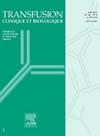The potential mechanisms of extracellular vesicles in transfusion-related adverse reactions: Recent advances
IF 1.2
4区 医学
Q4 HEMATOLOGY
引用次数: 0
Abstract
Blood transfusion is an irreplaceable clinical treatment. Blood components are differentiated and stored according to specific guidelines. Storage temperatures and times vary depending on the blood component, but they all release extracellular vesicles (EVs) during storage. Although blood transfusions can be life-saving, they can also cause many adverse transfusion reactions, among which the effects of EVs are of increasing interest to researchers. EVs are submicron particles that vary in size, composition, and surface biomarkers, are encapsulated by a lipid bilayer, and are not capable of self-replication. EVs released by blood cells are important contributors to pathophysiologic states through proinflammatory, coagulant, and immunosuppressive effects, which in turn promote or inhibit the associated disease phenotype. Therefore, this review explores the potential mechanisms of hematopoietic-derived EVs in transfusion-associated adverse reactions and discusses the potential of the latest proteomics tools to be applied to the analysis of EVs in the field of transfusion medicine with a view to reducing the risk of blood transfusion.
细胞外小泡在输血相关不良反应中的潜在机制:最新进展。
输血是一种不可替代的临床治疗方法。血液成分是根据特定的准则进行区分和储存的。储存温度和时间因血液成分而异,但在储存过程中都会释放细胞外囊泡(EVs)。虽然输血可以挽救生命,但也会引起许多不良的输血反应,其中ev的影响越来越引起研究人员的兴趣。电动汽车是亚微米颗粒,其大小、组成和表面生物标志物各不相同,被脂质双分子层包裹,并且不能自我复制。血细胞释放的ev通过促炎、凝血和免疫抑制作用对病理生理状态起重要作用,进而促进或抑制相关疾病表型。因此,本文将探讨造血源性EVs在输血相关不良反应中的潜在机制,并讨论最新蛋白质组学工具在输血医学领域EVs分析中的应用潜力,以期降低输血风险。
本文章由计算机程序翻译,如有差异,请以英文原文为准。
求助全文
约1分钟内获得全文
求助全文
来源期刊
CiteScore
2.50
自引率
11.80%
发文量
234
审稿时长
36 days
期刊介绍:
Transfusion Clinique et Biologique, the official journal of the French Society of Blood Transfusion (SFTS):
- an aid to training, at a European level
- the only French journal indexed in the hematology and immunology sections of Current Contents
Transfusion Clinique et Biologique spans fundamental research and everyday practice, with articles coming from both sides. Articles, reviews, case reports, letters to the editor and editorials are published in 4 editions a year, in French or in English, covering all scientific and medical aspects of transfusion: immunology, hematology, infectious diseases, genetics, molecular biology, etc. And finally, a convivial cross-disciplinary section on training and information offers practical updates.
Readership:
"Transfusers" are many and various: anesthetists, biologists, hematologists, and blood-bank, ICU and mobile emergency specialists...

 求助内容:
求助内容: 应助结果提醒方式:
应助结果提醒方式:


